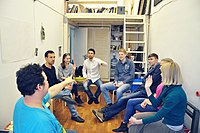
Photo from wikipedia
The faculty of language allows humans to state falsehoods in their choice of words. However, while what is said might easily uphold a lie, how it is said may reveal… Click to show full abstract
The faculty of language allows humans to state falsehoods in their choice of words. However, while what is said might easily uphold a lie, how it is said may reveal deception. Hence, some features of the voice that are difficult for liars to control may keep speech mostly, if not always, honest. Previous research has identified that speech timing and voice pitch cues can predict the truthfulness of speech, but this evidence has come primarily from laboratory experiments, which sacrifice ecological validity for experimental control. We obtained ecologically valid recordings of deceptive speech while observing natural utterances from players of a popular social deduction board game, in which players are assigned roles that either induce honest or dishonest interactions. When speakers chose to lie, they were prone to longer and more frequent pauses in their speech. This finding is in line with theoretical predictions that lying is more cognitively demanding. However, lying was not reliably associated with vocal pitch. This contradicts predictions that increased physiological arousal from lying might increase muscular tension in the larynx, but is consistent with human specialisations that grant Homo sapiens sapiens an unusual degree of control over the voice relative to other primates. The present study demonstrates the utility of social deduction board games as a means of making naturalistic observations of human behaviour from semi-structured social interactions.
Journal Title: PLoS ONE
Year Published: 2022
Link to full text (if available)
Share on Social Media: Sign Up to like & get
recommendations!